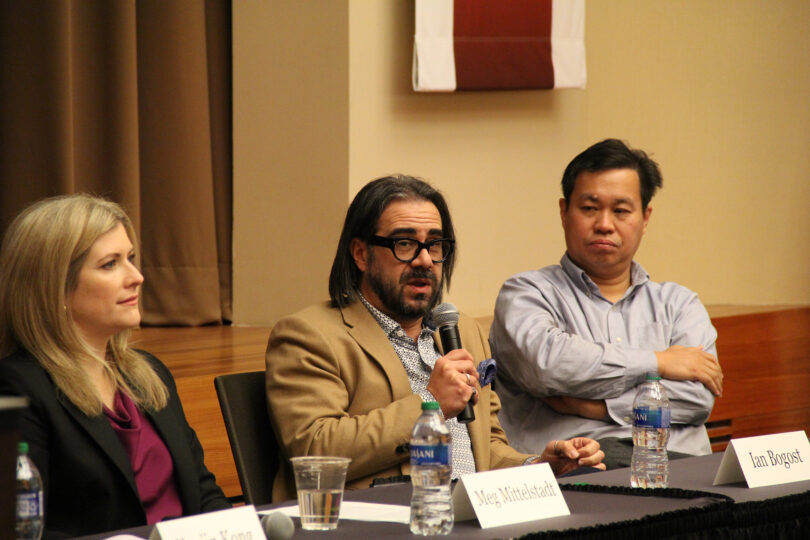Faculty from across the University of Georgia campus gathered on Nov. 30 to discuss the expanding influence of artificial intelligence, share insights into their research and consider how AI may shape higher education and society in the future.
The university’s inaugural Artificial Intelligence and Data Science Across Disciplines Symposium was hosted by the Institute for Artificial Intelligence with support from the Office of the Senior Vice President for Academic Affairs and Provost, the Office of Research and the Franklin College of Arts of Sciences.
“The symposium is part of a series of events geared toward bringing together the AI and data science faculty at UGA,” said Khaled M. Rasheed, director of the Institute for Artificial Intelligence and a professor in the School of Computing. “It was an exciting opportunity for the AI community at UGA to connect and learn.”
The symposium, held at the University of Georgia Center for Continuing Education & Hotel, showcased UGA’s significant investments in the fields of artificial intelligence and data science. Those investments include an ambitious presidential interdisciplinary faculty hiring initiative that aims to recruit 70 faculty members with expertise in applying data science and artificial intelligence to some of society’s most urgent challenges.
Rather than being housed exclusively in a single department, the majority of UGA’s newly recruited faculty will focus on the fusion of data science and AI in cross-cutting areas such as infectious diseases, integrative precision agriculture, ethics, cybersecurity, resilient communities and the environment.
“The breadth of experience and expertise at the University of Georgia uniquely positions our institution to advance AI and data science scholarship and research,” said Jeanette Taylor, the university’s vice provost for academic affairs. “We are able to integrate perspectives from a diverse array of disciplines as we consider not only potential uses for AI but also the ethical and social questions that arise.”
Ian Bogost, Barbara and David Thomas Distinguished Professor at Washington University in St. Louis with a dual appointment as professor and director of film and media studies and professor of computer science and engineering, provided the symposium’s keynote address.
Bogost urged attendees to avoid viewing generative AI, such as ChatGPT and Dall-E, as a tool for process optimization at the expense of imagination.
“AI works best for me when I use it to extend my imagination,” he said.
The symposium also featured two “lightning rounds” of brief talks by UGA faculty members from a wide range of disciplines. Faculty highlighted their use of AI and data science in research topics such as crop modeling and assessment, physics-informed machine learning for infectious disease forecasting, data science in advanced manufacturing and AI’s integration into society.
A panel discussion closed the symposium. Participants examined the impact of AI and ChatGPT on teaching and learning at UGA, industries that stand to benefit from AI and the ethics of AI in research and society, among other topics.
Building upon the momentum of the symposium, UGA’s Office of Research will host an AI Team Acceleration Event on Feb. 5 at the Delta Innovation Hub. This event will include presentations from research teams funded by Presidential Interdisciplinary Seed Grants and an overview of major university resources available to research teams.
UGA is now gathering input from faculty regarding potential interdisciplinary research collaborations. The Office of Research will filter those responses through AI to identify affinity groups faculty can join, and the AI Team Acceleration Event will include time for those groups to meet and begin discussions of possible research projects.








